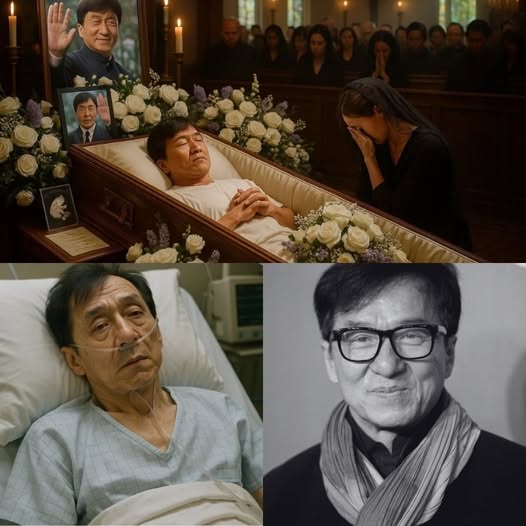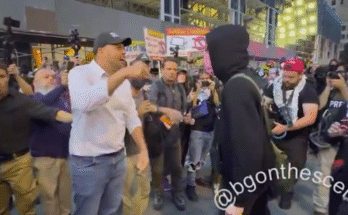
Opening: The Curtain Falls, But the Echo Remains
As dawn broke over Hong Kong this morning, a gentle hush seemed to settle across the city that raised him — a stillness too profound to name. The news spread quickly, yet few could truly believe it: Jackie Chan, the indomitable force of cinema, the man who turned danger into laughter and pain into poetry, has taken his final bow from the stage of life.
For generations, his smile was a bridge between cultures, his stunts a language that spoke directly to the heart. From the rooftops of Kowloon to the glittering lights of Hollywood, his journey was not merely that of an actor — it was the odyssey of a man who devoted every heartbeat, every scar, and every breath to his art.
Today, the world does not just mourn an entertainer. It bids farewell to a spirit that defined courage, resilience, and joy itself.

From Humble Beginnings
Born Chan Kong-sang in 1954 to humble parents who worked as servants at the French Embassy in Hong Kong, Jackie Chan’s early years were far from glamorous. He was a lively child, brimming with energy, often described by neighbors as “the boy who never stopped moving.” That restless spirit would later define his entire life.
At just seven years old, Jackie was enrolled in the rigorous China Drama Academy, a Peking Opera school under the stern guidance of Master Yu Jim-Yuen. There, discipline was absolute. Days began before sunrise, filled with acrobatics, martial arts, singing, and acting — repeated endlessly until perfection became second nature. Punishment was swift, but so was progress.
In later interviews, Jackie would recall the pain and loneliness of those years. “We had no toys, no holidays, no hugs,” he once said. “But we had each other — and we learned never to give up.”
Those formative years forged not just a performer, but a survivor — a young man whose body became both his instrument and his armor.
Crafting a Unique Style: The Birth of the Everyman Hero
When Jackie Chan entered the Hong Kong film industry in the 1970s, the shadow of Bruce Lee loomed large. The world wanted another stoic, invincible warrior. Jackie, however, wanted something different.
He infused comedy into combat, turning fights into balletic chaos filled with improvisation, clumsiness, and heart. His characters got hurt, fell down, made mistakes — but always got back up. That vulnerability was revolutionary. He gave audiences not just a hero, but a mirror of humanity.
In Drunken Master (1978), he created a new archetype: the reluctant hero whose grace and grit were matched only by his humor. Later came Project A, Police Story, Armor of God, and Who Am I? — each a showcase of his fearless choreography and cinematic innovation.
Every leap across a rooftop, every bone-jarring fall was real. Jackie didn’t rely on visual effects; he relied on courage, timing, and precision. His camera didn’t lie — and that truth became his signature.
“Pain,” he once joked, “is my co-star.”

The Pain Behind the Art
Behind the laughter and applause, Jackie Chan’s career was written in bruises and near misses. He broke almost every bone in his body — from skull fractures to dislocated shoulders, shattered ankles to crushed vertebrae.
The 1985 accident on Armor of God nearly cost him his life. A simple jump went wrong, and he fell headfirst onto a rock, fracturing his skull and leaving a permanent hole that doctors filled with a metal plate. Most would have stopped. Jackie returned to set within weeks.
“It’s not about being fearless,” he once said quietly. “It’s about being afraid — and doing it anyway.”
That raw courage made his art transcendent. Every injury became a line in the story of his devotion. Every scar, a silent reminder that cinema, for him, was not performance — it was faith.
Global Recognition and Influence
By the 1990s, Jackie Chan had become a household name beyond Asia. His rise to international fame was both improbable and inevitable. Films like Rumble in the Bronx (1995) and Rush Hour (1998) introduced Western audiences to his blend of martial artistry and slapstick warmth.
Suddenly, he was everywhere — late-night talk shows, red carpets, theme songs, and animated cameos. But beneath the global stardom, Jackie remained the same curious, mischievous kid from Hong Kong, always experimenting, always pushing boundaries.
Hollywood adored him, yet he never abandoned his roots. He continued making films in Hong Kong with the same creative control, crafting elaborate stunts and emotional stories that balanced spectacle with sincerity.
In 2016, after more than 200 films and over five decades of service to cinema, Jackie Chan received an honorary Academy Award — recognition not only for his art but for the indomitable human spirit it embodied.
When accepting the award, he smiled and said, “After 56 years, I finally have one of these. It’s heavier than I thought.” The audience rose in applause, many in tears.

A Cultural Bridge
Jackie Chan was more than a movie star — he was a cultural ambassador. His films united East and West, blending Chinese philosophy with universal humor and emotion.
Through his stunts, he communicated something timeless: that strength without humility is hollow, and laughter without pain is incomplete. His characters, though fictional, embodied values deeply human — perseverance, loyalty, and compassion.
Off-screen, Jackie dedicated much of his life to philanthropy. The Jackie Chan Charitable Foundation, established in 1988, supported disaster relief, education, and medical aid across Asia. He donated millions quietly, often without press coverage. “If you have more than you need,” he once said, “build longer tables, not higher walls.”
To young artists, he was a mentor. To audiences, he was family.
Farewell to a Tireless Performer
Whether this farewell marks the end of his journey or his retirement from the public eye, it is difficult to imagine cinema without him. For over half a century, Jackie Chan was motion itself — a blur of laughter, pain, and grace.
In one of his final interviews, he reflected, “I don’t want people to remember my stunts. I want them to remember that I tried. Every day, I tried.”
Perhaps that is his greatest legacy — not perfection, but perseverance.
As fans lit candles outside Hong Kong’s Avenue of Stars tonight, the city seemed to pause. Somewhere, a projector flickered through an old reel of Police Story, and there he was again — running, falling, laughing, getting back up. Always getting back up.
Timeless Memories on Screen
How does one measure a lifetime of memories?
In the sound of shattering glass as he leaps from a mall balcony (Police Story).
In the chaos of ladders, chairs, and props turned into weapons (First Strike).
In the joy of watching him sing his own theme songs, eyes sparkling with mischief.
In the global laughter that filled theaters as he bantered with Chris Tucker in Rush Hour.
Every frame was a love letter — to cinema, to risk, to the audience. His films were not just entertainment; they were reminders that life, like art, is a dance between failure and courage.
Even in stillness, he moved hearts.

The Person Behind the Legend
Those who knew Jackie Chan personally describe him not as a superstar, but as a man who loved small things. He collected watches and handwritten letters. He visited old crew members’ families during holidays. He often returned to film sets unannounced — just to thank the technicians.
Director Stanley Tong once recalled, “He’d finish shooting, then stay behind to sweep the floor. He said, ‘The set gave me everything — I should take care of it.’”
His collaborators speak of endless patience, humility, and humor that could dissolve tension in seconds. “He was the first to laugh at himself,” said actress Michelle Yeoh. “And somehow, that made us all stronger.”
To his family, he was not a global icon but a father who loved bad jokes and long walks. To his fans, he was proof that humanity could shine even through the toughest battles.
A Legacy That Will Endure
Jackie Chan’s story is no longer confined to celluloid — it lives in every artist who dreams of doing the impossible, every child who learns to rise after a fall. His legacy is movement, not just in body, but in spirit.
Though the lights dim and the cameras rest, his laughter continues to echo across generations. His work remains a masterclass in what it means to live without fear — to create, to give, and to love without restraint.
The world may have said goodbye, but legends do not leave — they transform. His life, lived at full speed, remains an indelible part of our shared imagination.
Goodbye, But Never Forgotten
As the sun sets over Victoria Harbour, the city glows with a golden haze. Somewhere, perhaps, a silhouette stands at the edge of a rooftop — gazing out, smiling softly, ready for one last leap.
Jackie Chan gave his youth, his body, and his laughter to art. In return, he gave the world something that will never fade: joy, courage, and humanity.
He may have stopped leaping from rooftops,
but his spirit will forever soar.



